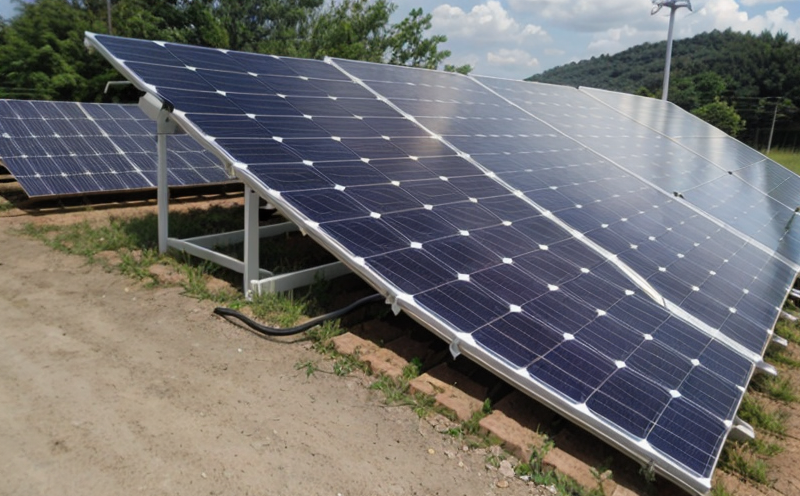UL 1741 PV Inverter Compatibility Testing with Modules
The UL 1741 standard is a critical benchmark for ensuring that photovoltaic (PV) inverters operate safely and efficiently within the grid. This testing ensures compatibility between solar panel modules and inverter systems, which is essential for maintaining reliability and safety in energy production and distribution.
UL 1741 PV Inverter Compatibility Testing involves a series of rigorous tests aimed at verifying that an inverter can interface with photovoltaic (PV) modules without causing hazards or degrading performance. This service focuses on the specific requirements laid out by UL 1741, which include voltage compatibility, current regulation, power factor correction, and anti-islanding protection.
The testing process for UL 1741 compliance involves several stages:
- Voltage and Current Testing: Ensuring the inverter can handle the voltage and current output of the PV modules without exceeding safe limits. This includes verifying that the inverter can maintain stable operation under various conditions, including maximum power point tracking (MPPT).
- Power Factor Correction: Checking if the inverter corrects the power factor to unity or better, which is essential for minimizing reactive power consumption and improving grid efficiency.
- Anti-Islanding Protection: Testing ensures that the inverter can safely disconnect from the grid in case of an islanding condition. Islanding occurs when a portion of the grid becomes isolated from the main supply, potentially leading to dangerous situations if not handled properly.
The UL 1741 PV Inverter Compatibility Test is not just about meeting regulatory requirements but also ensuring that systems operate efficiently and safely under real-world conditions. This service helps manufacturers and installers ensure their products meet the highest standards of performance, safety, and reliability.
By adhering to these stringent tests, companies can build trust with customers and stakeholders, demonstrating a commitment to quality and compliance. Additionally, this testing process ensures that PV inverters are compatible with various types of solar panels, thereby enhancing system integration and reducing potential points of failure.
Benefits
The UL 1741 PV Inverter Compatibility Test offers numerous benefits to manufacturers, installers, and end-users:
- Safety Compliance: Ensures that the inverter complies with all applicable standards and regulations, reducing the risk of hazards and accidents.
- Enhanced Efficiency: By optimizing power factor correction and voltage regulation, inverters can operate at higher efficiencies, leading to cost savings for users.
- Increased Reliability: The testing process identifies potential issues early on, ensuring that the system performs reliably under various conditions.
- Maintained Grid Stability: Properly tested inverters contribute to grid stability by preventing islanding events and maintaining consistent power quality.
- Better Customer Satisfaction: By meeting strict safety and performance standards, companies can improve customer trust and satisfaction, leading to increased market share.
- Regulatory Compliance: Ensures that products meet or exceed local, national, and international regulatory requirements, facilitating smoother operations and reducing the risk of penalties.
In summary, UL 1741 PV Inverter Compatibility Testing is a cornerstone for ensuring safe, efficient, and reliable solar energy systems. This service not only helps companies comply with regulations but also enhances their reputation in the market, leading to greater customer confidence and satisfaction.
Customer Impact and Satisfaction
The impact of UL 1741 PV Inverter Compatibility Testing on customers is profound, affecting both the quality of service they receive and their overall satisfaction. Here are some key areas where this testing enhances customer experience:
- Safety Assurance: Customers receive systems that are rigorously tested for safety, reducing the risk of accidents and injuries.
- Predictable Performance: By ensuring compatibility between inverters and PV modules, customers can expect reliable performance over time, minimizing downtime and maintenance costs.
- Eco-Friendly Solutions: Compliant systems contribute to a more sustainable energy future, aligning with environmental goals and expectations of environmentally conscious consumers.
- Enhanced Reputation: Companies that undergo this testing can build a reputation for quality and reliability, which enhances customer trust and loyalty.
In addition to these direct benefits, the testing also helps customers comply with local regulations, ensuring they are in line with industry standards. This not only reduces the risk of legal issues but also ensures that their systems operate efficiently within the grid.
Ultimately, the impact of this service extends beyond just the product itself; it influences customer confidence and satisfaction, leading to long-term relationships and repeat business. By investing in UL 1741 PV Inverter Compatibility Testing, companies can ensure they are delivering high-quality products that meet both regulatory requirements and customer expectations.
Competitive Advantage and Market Impact
The implementation of UL 1741 PV Inverter Compatibility Testing offers significant competitive advantages for companies operating in the renewable energy sector. By ensuring compliance with this standard, businesses can differentiate themselves from competitors by offering safer, more efficient, and reliable products.
Compliance with UL 1741 not only meets regulatory requirements but also sets a benchmark of excellence that customers can trust. This can lead to increased market share as consumers are more likely to choose suppliers who prioritize safety and quality.
In the competitive landscape of renewable energy, where standards for safety and efficiency are constantly evolving, staying ahead of these changes is crucial. By incorporating UL 1741 testing into their processes, companies can anticipate future regulatory changes and market trends, ensuring they remain at the forefront of innovation.
The market impact of this service extends beyond individual companies; it contributes to a broader goal of improving grid stability and reducing environmental impact. By promoting safer and more efficient energy systems, compliant companies contribute to a cleaner and more sustainable future for all.
In conclusion, UL 1741 PV Inverter Compatibility Testing is not just about meeting regulatory requirements but also about setting new standards in the industry. This service helps businesses gain a competitive edge while contributing positively to the market and society as a whole.





